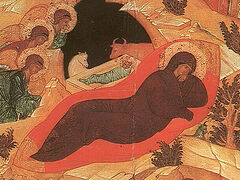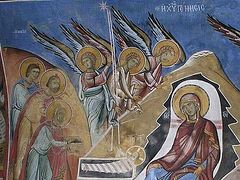Now, beloved brethren, in these moments, let us try to prepare for this evening, in order to understand what the Nativity of Christ means for us and why we need a Savior.
Now, when we hear a thousand times a day that there is no Savior, that we don’t need a Savior, we especially need to clarify why we need Him, why we can’t be saved without Him.
Therefore, let us now take these words of the Savior that will show us that we need Him. The Lord said in the Gospel: They that be whole need not a physician, but they that are sick (Mt. 9:12).
Only when we see that we are seriously ill, severely ill, only then will we move away from unbelief and see that we need a Savior and turn to Him. And until we turn our gaze to ourselves and see our spiritual illnesses, we will be walking in darkness and ignorance. Therefore, let us try to understand: What is the sickness of our soul? Above all, it is sick with the passions, and then it experiences the machinations of the devil and bears the beginnings of eternal death within itself, for great are the crimes of mankind, as said one saint who saw 365 regiments of demons, according to the number of human sins.
First of all, let us look at our mind. Often, we’re unable to cope with our thoughts; they draw us in—terrible, lustful, unrestrained, such that we often have no strength to resist them. We want to pray, but our mind is distracted; we imagine sinful, anxious images and we’re filled with daydreaming, so it’s not surprising if we leave church without having received any consolation. You see, our mind is sick with overthinking and worry, it’s distracted by dreams and can’t overcome this, although it suffers greatly—that means we need a Savior. Let us look at our heart—it’s also sick. It’s sick with the greatest self-love, which seems to have three branches coming from it.
The first branch is pride. Since the time when the devil deceived men by telling them they would be like gods, the world has been full of pride, and men are mired in this vice. Man can’t bear words from other people, can’t bear reproach and condemnation—he becomes entirely inflamed with pride. And this pride, this impatience is so strong in us that if, for instance, a wife wants to prepare a fasting meal, the husband is ready to kill her, because he can’t tolerate anything he doesn’t want. Man takes care to ensure that his honor remain untouched; he trembles for it, and can’t allow even the smallest insulting word against himself. Or, look how selfish man is—he doesn’t do anything that’s not to his own benefit. Every good presupposes at least some small benefit for himself. We’re all power-loving, glory-loving, self-confident; we love to be praised; we look for our own profit and benefit everywhere; we rush in pursuit of these illusory benefits. The second branch of self-love is self-interest, which lives firmly in our heart, which destroys all good feelings, good manifestations, which fundamentally eats up the best impulses of our soul.
And if we talk about the lust of the flesh, then we must directly draw the curtain, because this lust fills us to such an extent that it’s impossible to disclose the whole terrible abyss of our souls. If we finally look at our will, we’ll see that all our desires and words remain desires and words, and we’re far from action: We have no willpower; we can’t force ourselves to do what the Lord has commanded us; our will is very sick. The will doesn’t hinder our impulses, so sin unrestrainedly drags us to ruin, just as wine draws a drunkard to taverns and pubs.
See what our mind, heart, and will represent—they are severely and seriously ill. We need a Savior to heal them, to deliver them from sickness. Therefore, we must take a closer look at ourselves, see ourselves in our grave illness and call out to the Lord.
A sinful man and a holy man differ only in that one sins more and the other less; the saints can sin up to seven a times a day in thought, but we turn thoughts into deeds—and there is none without sin. This is why the saints reproached themselves so. It is said of [St.] Theophan of Vysha, that while a recluse, he would say to himself: “Eh, Theophan, where do you fit in? They call you a recluse, but this makes me laugh, because you make one prostration then lie down on your side; and for everything that you write, you yourself don’t fulfill a word of it .” And about [St.] Ignatius (Brianchaninov), that great teacher of the Russian Church, it is said that he constantly wept and lamented for his soul. And if these holy men wept and repented constantly, then how should we weep for our sick soul in such need of the Divine Physician!
Thus, if we look at our soul, we’ll see that it is evil, that it loves to dominate, it’s proud, lustful, wholly wounded by these passions, this mass of its sins. Can we really say it’s not in need of healing?
If we look deeper into our soul, we’ll see the devilish actions that Satan makes against us. Even a doctor often doesn’t know what’s going on inside the human body. And within every man, demons agitate the blood, causing many sinful experiences to come about. All our passions are the result of the actions of demons on our blood; if, let’s say, a man gets angry, his blood is agitated, it’s a demon that agitates it. And if a man fights with lust, then the devil again agitates his blood. Therefore, all the bodily passions are the result of the devil’s work in agitating our blood and bringing various vices to life.
Now you see how sick our soul is, you see how it needs redemption—a Savior. But how, you’ll ask, can it receive this healing; how can it be amended? The soul can achieve healing through the Holy Scriptures, prayer, and the Sacraments of the Church.
No one has seen God, but anyone can experience His power for himself, because the Lord reveals Himself in the action of this power. When we begin to listen to or read the Holy Scriptures, the power of God works in us: The sounds reach our ears, Divine thought reaches our mind, and the great power of God reaches our mind, filling the soul with inexpressible joy and giving it joy, as David said: How sweet to my palate are Thy sayings! more sweet than honey to my mouth (Ps. 118:103).
When a man begins to pray in humility of heart, then his unseen mind stands before the unseen God. Then the formless power of God’s grace descends upon the humble, formless soul and illuminates it; therefore, peace, tranquility, and a clear disposition appear in the soul. And through the Sacraments, through these eternal signs of grace, the wondrous power of God is given to us, but only when we truly repent; then we worthily receive this healing help of Christ. We must recognize ourselves as sinners, worse than Satan—only then will we be worthy of this power of God’s grace.
So, you see, our soul is sick, our mind, heart, and will are sick; we are full of passions; our soul is sick with self-love and pride, and the devil, acting on the blood, propels it and causes various sins and passionate impulses. This is especially proven by sectarians. Look how their eyes burn; they’re always excited; they think the power of God is at work within them, but in fact, it’s the work of the devil, stirring up their blood.
Knowing our sins, we now see that we need a Savior, that we can’t be saved without Him. Therefore, today, when it’s proclaimed that in a pitiful manger in Bethlehem was born Christ, Who came to save mankind from his sin—it will be clear that He came to save us, and we will fall down before Him with our lips and heart in prayer, repentance, and the word of God, striving only for Him Who works our salvation—the loving, forgiving God.
Amen.




